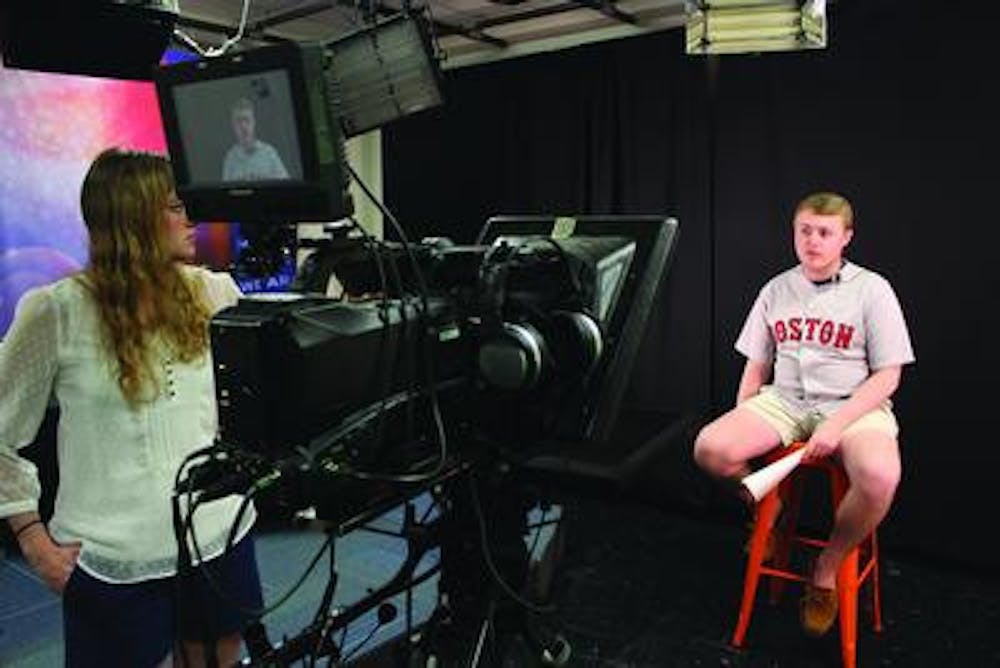Mercer University junior Drew Winslett sat in a chair inside a dimly lit broadcast station with a printed copy of a story detailing an incident of relationship violence.
But it’s not his own.
Winslett is one of the student advocates for Bears Speak, a student-led sexual assault awareness video campaign.
Taylor Jolly, Student Government Association’s vice president, organized the campaign for her senior service scholars project. Emily Thompson and Sarah Pounds, sophomores, have helped film and manage the project.
The campaign’s premise is to film campus leaders reading aloud first-person narratives from survivors of sexual assault and relationship violence. All of the stories will be edited into a 15 to 20 minute video that will be shown in freshman UNV classes this fall, Jolly said.
For many of the stories shown in the video, Mercer’s Title IX coordinator, Melissa Nunn, helped victims write their stories.
All of the survivors’ submitted stories have reported incidences of sexual assault to Nunn or have tried a judicial case or are in the process of trying a case, Jolly said.
The stories are handed over to Jolly who plans a time for what Jolly refers to as “student leaders” such as Winslett, who serves on SGA, to be filmed reading the victim’s story aloud in Mercer University’s broadcasting station near the Center for Collaborative Journalism.

Having student leaders — or students who are involved in campus organizations—take a public stance against sexual violence sends a powerful message, Jolly said.
She said that she hopes the narratives will create a more open, safe environment for students to report sexual assault crimes. Mercer’s Quality Enhancement Plan is funding Bears Speak, since research methods are being used to serve the community, Jolly said.
The idea for the video campaign began in November. Jolly and a group students sat outside the SGA office discussing Mercer’s problems with sexual assault and the potential ways the university could improve student awareness.
“’Mercerians don’t realize that it happens on our campus,” Jolly said. “They think that we’re exempt from this national epidemic of sexual assaults on our campus.”
Although campus events like The Crisis Line and Safe House’s Take Back the Night give victims a platform to share their stories, many survivors often feel unsafe sharing private details in a public setting.
Also, many students, particularly Greek and student athletes, resent being forced to attend mandatory lectures on sexual assault, Jolly said.
Originally, the SGA vice president said she planned on releasing short videos of sexual assault stories over social media. The advocates would relay the stories and what Jolly referred to as “high-impact videos,” which would hopefully initiate a culture change on campus.
Jolly said she also wanted to create a Google form for students to fill out, so they could anonymously share their stories.
Mercer’s administration officials expressed concerns on the stories’ validity if they could be submitted over Google Forms. There was also growing concerns with the portrayal of Mercer’s campus safety, Jolly said.
[pullquote speaker="Taylor Jolly" photo="" align="left" background="on" border="all" shadow="on"]I’m excited to tell the stories that we have, and I’m excited that this will be perpetuated in some way.[/pullquote]
Jolly said that university officials informed her in a email that her project should be condensed into one video and could not be shared outside of Mercer’s campus. The video would also need to have an educational piece tied to it.
When Senior Vice President for Marketing and Communications Larry Brumley was asked for feedback on the Bears Speak project by Jolly, he said he had concerns the video would reach the proper audience.
“If the intended audience is the Mercer community, how do we make sure it’s targeted toward the Mercer community and not just, you know, everybody in the world without the context?” Brumley said.
Brumley said that student safety was also a concern because having students talking about sensitive issues on camera “might not be good for them.”
“My suggestion was to find a platform that reaches that target audience,” Brumley said.
Since beginning the project, Jolly said she’s had several people come up to her requesting to share their story. Unless the victim has reported their case to Nunn, Jolly cannot share their story.
Nunn said in a recent interview that she supports Jolly’s project but is not directly involved.
“One of our hopes is that this will increase reporting,” Jolly said. “To know that these [stories] were reported to Melissa Nunn, and they were supported.”
Jolly plans on releasing a short clip of the video at Take Back the Night on April 21.
“I’m excited to tell the stories that we have, and I’m excited that this will be perpetuated in some way,” Jolly said. “This video can be shown for multiple years . . . it’s not just a one time thing.”





